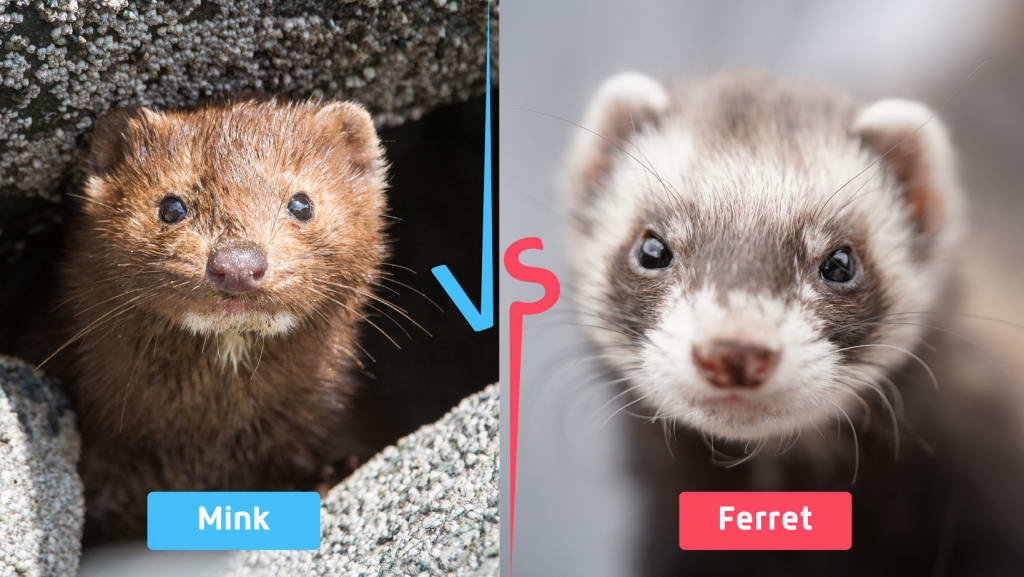Mink vs Ferret
Understanding the Differences

Minks and ferrets are small, furry animals that are often confused due to their similar physical appearances. However, despite their similarities, there are significant differences between these two creatures that are important to understand before deciding which one would make the best pet.
The purpose of this blog is to provide a comprehensive comparison of minks and ferrets, highlighting the key differences between them in terms of their physical characteristics, behavior, temperament, habitat and diet, domestication and ownership, and health and lifespan.
Mink vs Ferret
Physical Characteristics - Mink vs Ferret
Regarding physical characteristics, several differences between these two mammals set them apart.
Size and Weight
Minks are generally larger and heavier than ferrets. On average, minks can weigh anywhere from 1 to 3 pounds and measure between 12 to 18 inches, while ferrets typically weigh between 1 to 2 pounds and measure around 18 inches in length.
Fur Color and Texture
Minks have dark, glossy fur ranging from brown to black, with a white patch on their chin and throat. On the other hand, ferrets have softer, fuzzier fur that comes in various colors, including white, black, brown, and grey.
Unique Physical Features
One of the most notable differences between minks and ferrets is their special physical features. Minks have long, slender bodies and webbed feet, making them excellent swimmers. They also have sharp teeth and powerful jaws to catch and kill. Conversely, ferrets have long, thin bodies with short legs and tapered tails. They have a distinctive musky scent unique to their species and are used to mark their territory.
Overall, while both minks and ferrets share some similarities in their physical appearance, they have distinct differences that make each one unique in its way.
Behavior and Temperament - Mink vs Ferret
When it comes to behavior and temperament, they have some similarities but also some notable differences.
Social Behavior
Minks are generally solitary animals that prefer to hunt and live alone. They are not naturally social creatures and may become aggressive if forced to interact with other minks. On the other hand, ferrets are social animals that enjoy the company of humans and other ferrets. They are playful and curious creatures that love to explore their surroundings and interact with their environment.
Activity Level
Minks are highly active animals that are constantly on the move. They are skilled hunters that use their agility and speed for hunting. While also active, ferrets tend to have more bursts of energy followed by rest periods. They are playful creatures that love to run, jump, and play with toys.
Unique Behaviors
They have unique behaviors specific to their species. For example, minks are known for their ability to swim and dive underwater to catch fish and other prey. Ferrets, on the other hand, are known for their playful and mischievous personalities. They are known to steal and hide objects in their caves and love playing games like hide-and-seek with their owners.
While they have distinct behaviors and temperaments, ferrets tend to be more social and playful, while minks are more solitary and active hunters.
Habitat and Diet - Mink vs Ferret
Both mammals have different natural habitats and dietary needs, reflecting their unique survival adaptations in the wild.
Natural Habitat
Minks are semi-aquatic animals that live near bodies of water such as rivers, streams, and lakes. They make their homes in caves near the water's edge and spend much time swimming and hunting for fish, frogs, and other aquatic prey. Ferrets, on the other hand, are land animals that make their homes in caves underground. They are found in various habitats, including grasslands, forests, and deserts.
Dietary Needs and Preferences
Minks are carnivorous animals that require a diet high in protein and fat. Their diet in the wild consists primarily of fish and small mammals such as rodents and rabbits. Ferrets are also carnivorous and require a diet high in protein, but they have a more varied diet that includes meat and vegetables. In captivity, ferrets are often fed a diet of commercial ferret food specially formulated to meet their nutritional needs.
Unique Adaptations
Ferrets and minks have unique adaptations that help them survive in the wild. Minks have webbed feet and are excellent swimmers. They also have a thick, waterproof coat that keeps them warm and dry in cold environments. Conversely, ferrets use sharp teeth and claws to catch and hunt. They also have long, flexible bodies to navigate through narrow caves and tunnels.
Understanding minks' and ferrets' habitat and dietary needs is essential for their health and well-being in captivity. While both animals have unique adaptations for survival in the wild, they require specific diets and living conditions to thrive in captivity.
Domestication and Ownership - Mink vs Ferret
While ferrets and minks can be kept as pets and domesticated, some critical differences exist in their suitability and care requirements.
Suitability as Pets
Ferrets are popular, playful, social, and entertaining pets. They are relatively easy to care for and can be trained to use a litter box. Conversely, Minks are not commonly kept as pets and can be more challenging to manage. They have a strong hunting instinct and may become aggressive if they feel threatened or stressed.
Care and Maintenance
Ferrets and minks require specialized care and maintenance to ensure their health and well-being in captivity. Ferrets require a cage large enough for them to play and exercise, as well as regular veterinary checkups and vaccinations. They also need a protein-rich diet and frequent grooming to prevent hairballs and other health problems. Minks require a larger and more complex habitat, including land and water areas. They also need a diet high in protein and fat and specialized veterinary care.
Unique Considerations
Owning a mink as a pet requires special permits and licenses in many states, as minks are regulated or restricted. Additionally, minks are not suitable pets for households with children or other pets, as their strong hunting instinct can lead to aggressive action. While more suitable as pets, ferrets may not be the best choice for households with young children or individuals with compromised immune systems, as they are known carriers of certain diseases.
While these two mammals can be kept as pets, ferrets are generally more suitable and easier to care for. Minks require specialized care and are not ideal for all households. Understanding each animal's unique considerations and requirements is essential when deciding which animal best fits your lifestyle and living situation.
Health and Lifespan - Mink vs Ferret
Minks and ferrets have different health issues and lifespans and require special care to maintain their health and well-being in captivity.
Common Health Issues
Ferrets are prone to several health issues, including gastrointestinal problems, dental disease, and adrenal disease. They are also susceptible to certain viruses, such as influenza and canine distemper. Minks are prone to respiratory infections, gastrointestinal problems, and dental disease. They can also contract certain viruses and parasites from their environment.
Lifespan
Ferrets have an average lifespan of 6-8 years, although some can live up to 10 years with proper care. On the other hand, Minks have a shorter lifespan of around four years in the wild and 8-10 years in captivity.
Unique Needs for Proper Health and Care
Proper nutrition and hygiene are essential for the health and well-being of both ferrets and minks. Ferrets require a diet high in protein and fat, regular grooming, and dental care. They also require regular veterinary checkups and vaccinations to prevent and manage health issues. Minks need a diet high in protein and fat and access to land and water areas for exercise and enrichment. They also require specialized veterinary care and may require additional supplements or treatments to maintain their health.
Understanding minks' and ferrets' unique health needs and lifespan is vital for proper care and ensuring their well-being in captivity. Regular veterinary checkups, adequate nutrition, and hygiene, are essential for both animals and may require additional considerations or treatments based on their health and environmental factors.
Conclusion - Mink vs Ferret
In conclusion, minks and ferrets may look similar at first glance, but they have many fundamental differences in their physical characteristics, behavior, habitat, diet, domestication, and health. Understanding these differences is essential for making an informed decision when choosing a pet.
Ferrets are generally more suitable as pets due to their playful and social nature, relatively easy care requirements, and shorter lifespan. Minks, on the other hand, require specialized care and are not commonly kept as pets.
When considering a pet, it's essential to research and understand the unique needs and requirements of the animal to ensure that you can provide proper care and maintain its health and well-being. This includes space requirements, dietary needs, veterinary care, and socialization needs.
In summary, while minks and ferrets can make exciting and entertaining pets, they have distinct differences that should be considered before deciding. With proper care and attention, both animals can thrive in captivity and provide companionship and entertainment for their owners.
If you're looking for more tips on giving your pet the best life possible, consider subscribing!
You may also be interested in reading:
Pied Cockatiel: Unlocking Their Unique Personality and Behaviors
About the Creator
Amir Hossain
I blog on everything and anything— hoping my blogs will make your days a bit happier!






Comments (1)
good efforts!!!